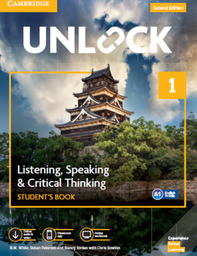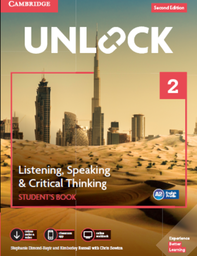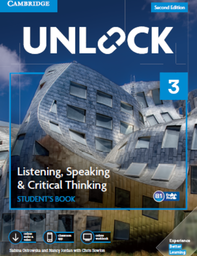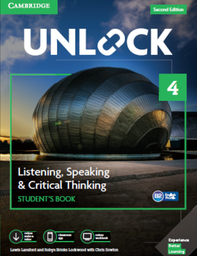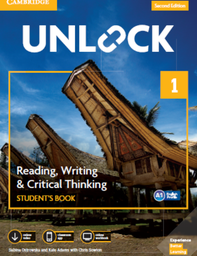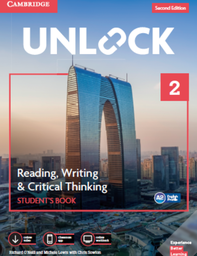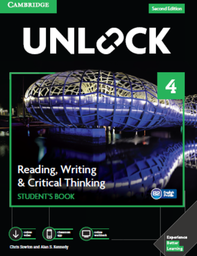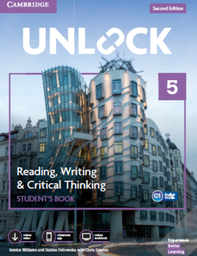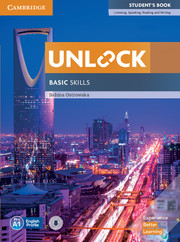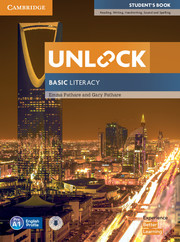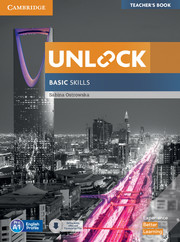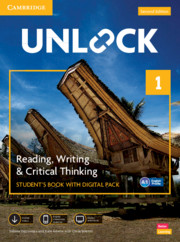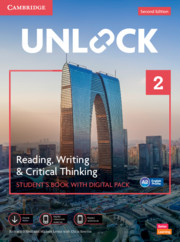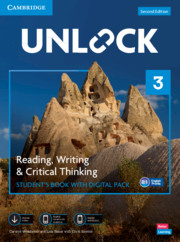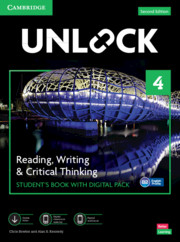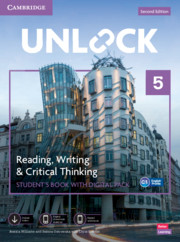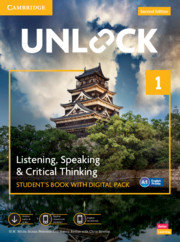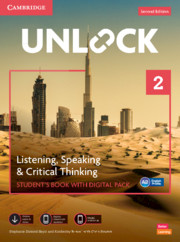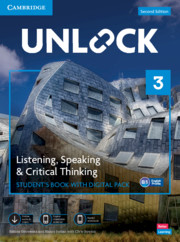Unlock 2nd Edition
Key features
Authentic videos on a range of academic topics accompanied by a comprehensive video lesson motivate learners.
Research from the Cambridge English Corpus and English Profile to focus on the language areas students find most challenging.
Teaches higher- and lower-order critical thinking skills with measurable objectives and self-evaluation.
What makes Unlock 2nd Edition special?
Unlock has been developed using the Cambridge Learner Corpus and English Vocabulary Profile. This guarantees that the language presented to your learners in Unlock is both up-to-date and relevant. Using these tools, our authors can see how English is used, identify common mistakes made by learners at a given level, and get additional information on the vocabulary that should be covered at each CEFR level.
This research is unique to Cambridge University Press and gives our authors an insight into language that they can then turn into accurate, effective learning materials.
Cambridge English Corpus
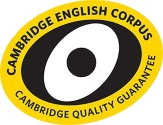
Unique research into academic words and common learner errors (thanks to exclusive access to Cambridge English Corpus) has been used to build the Unlock syllabus. In addition, using the Corpus to specifically analyse common learner errors from Cambridge English exam answers means that your learners’ needs are prioritized and that Unlock focuses on the right academic language for them.
English Vocabulary Profile

The English Vocabulary Profile tells us which words (and which meanings of words), and phrases learners typically know and can use at each level of the CEFR. It provides a complete searchable listing of the words and phrases in English that are considered to be within the levels of the CEFR, forming an invaluable reference for anyone involved in syllabus design as well as materials writers, test developers, teachers and teacher trainers.
To find out more please visit English Profile
Critical thinking in Unlock Second Edition …
Unlock Second Edition develops students’ ability to think critically in an academic context right from the start of their language learning. Critical thinking is at the heart of Unlock, fostering the skills and strategies students need to tackle academic tasks when gathering and evaluating information, organizing and presenting their ideas, and then reflecting on them.
Critical thinking in Unlock:
is informed by a range of academic research from Bloom in the 1950s, to Krathwohl and Anderson in the 2000s, to more recent considerations relating to 21st Century Skills
has a refined syllabus with a better mix of higher- and lower-order critical thinking skills
is measurable, with objectives and self-evaluation so students can track their critical thinking progress
is signposted with skill-specific icons so that students know which critical thinking skill they are focusing on and when
is supported with specific teacher development material on critical thinking in every unit of the all-new Teacher’s Manual and Development Pack so teachers can teach with confidence.
… so students have the confidence to apply the critical thinking skills they have developed in their future studies, giving them the best chance of academic success.
Critical Thinking Teacher Survey
See what teachers had to say about critical thinking below or find out more about what critical thinking skills are and why they are important.
View the interactive infographic. Click on the + symbols below to find out how Unlock Second Edition can help with teaching critical thinking.
The Cambridge Life Competencies Framework (CLCF) has been developed to provide clarity on the range of life skills, or 21st century skills, that can be integrated in English language programmes, and how those skills develop across the different stages of education. We have mapped levels 1-5 of the Unlock course to the framework.
The brochure below introduces the Framework and demonstrates how we have used the research behind the framework to ensure the development of core life skills as part of Unlock. The brochure also includes a section on practical use of the mapping for teachers to use with their students.
To find out more, click on the Unlock CLCF brochure.
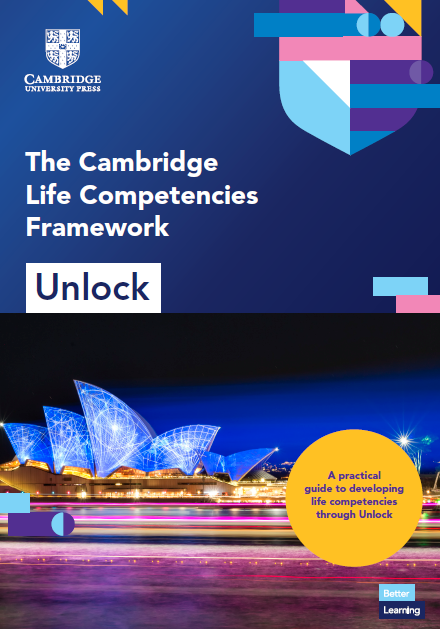
Unlock Basic has been developed for pre-A1 learners. Unlock Basic Skills combines Listening, Speaking, Reading and Writing to give students well-scaffolded, manageable skills practice.
What makes Unlock Basic Skills special?
Insights gained from expert teachers ensure the course meets the specific academic needs of your pre-A1 students.
Our research into over 5 million words students use and need has informed the language taught in Unlock Basic.
Listening, Speaking, Reading and Writing skills are integrated within academic contexts to provide students with an effective and manageable learning experience.
Watch and remember lessons in every unit include video and motivate students to recycle and extend the language they’ve learned.
An introduction to critical thinking skills supports students in speaking and writing as they take their first steps towards academic success. Course audio and video.
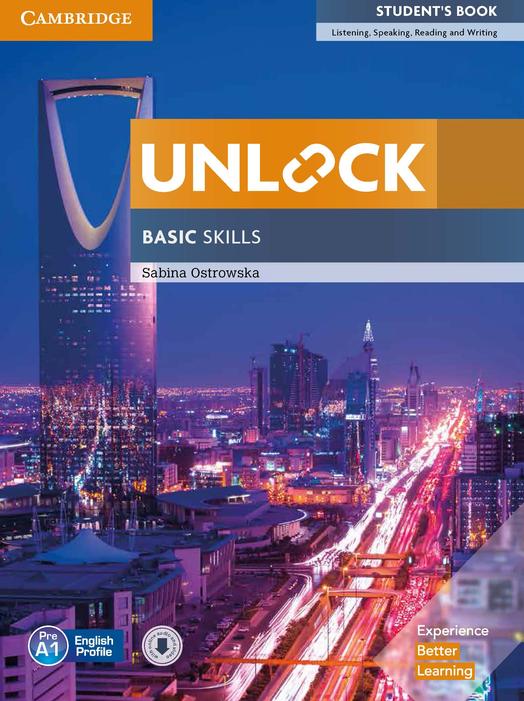
What makes Unlock Basic Literacy special?
Insights gained from expert teachers ensure the course meets the specific literacy needs of your pre-A1 students.
Our research into over 1 million words Arabic speakers use and need has informed the language taught in Unlock Basic Literacy.
Provides practice in left-to-right reading and writing, handwriting, sound and spelling, and key words for literacy.
Develops and builds confidence in literacy as students take their first steps towards academic success.
Can be used with or without Unlock Basic Skills, in class or for self-study.
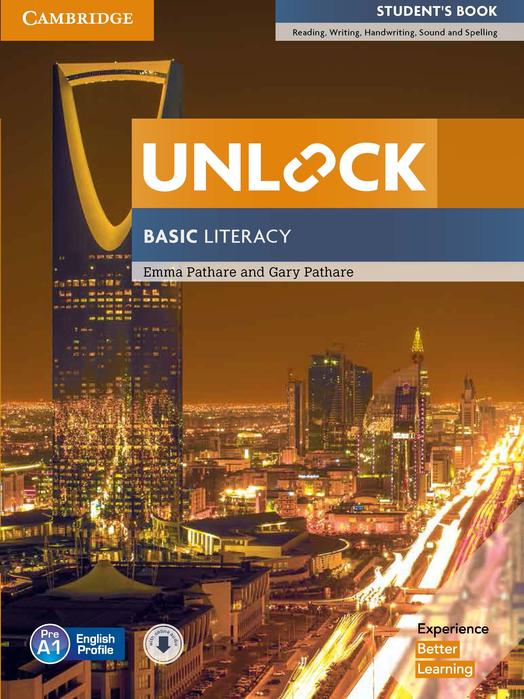
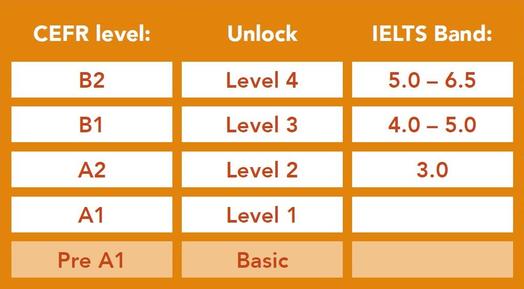
... Unlock Basic. Laying the foundations for academic success.
The impact of a language course
Schools and higher education institutions increasingly need to show that they are evaluating their language programmes and are using an effective language course. An impact study by Cambridge University Press can help demonstrate the value of a course for this purpose.
An impact study was carried out on Unlock 2nd Edition. One of the key aspects of Unlock is to develop students' ability to think critically in an academic context.
How to find out more
Request free sample
Get an e-sample that will allow you to view a product preview on your desktop.
Free sampleSample content
Join the conversation
Sample content
Sample units are available below for the 'Listening, Speaking and Critical thinking' and 'Reading, Writing and Critical Thinking' course books.
Listening, Speaking & Critical Thinking
Reading, Writing & Critical Thinking
Basic Skills & Literacy
Sample Video content and acknowledgements
All videos Level 1, 3, 4 and 5 supplied by Getty
Level 1 - "Fishermen" from Reading & Writing, Unit 1
Level 2 - “Harbin Ice Festival” from Listening & Speaking, Unit 2
Level 3 - “Childhood Obesity” from Listening & Speaking, Unit 5
Level 4 - “Disadvantaged children take part in trial of private tutor app” from Reading & Writing, Unit 2
Level 5 - “Designer Bikes Become Showcase for Social Status” from Listening & Speaking, Unit 2
Student’s Book with Digital Pack:
Every Student's Book comes with an activation code to access the Digital Pack
Students’ Digital Pack
Digital Workbook with videos: extension activities for every unit of the Student’s Book to further practice the grammar and target vocabulary of the unit in new contexts, as well as some listening and speaking practice. These short activities are perfect for students to do on their mobile phones, providing extra practice.
Digital Classroom Material: The Digital Classroom Material enables students to build on their skills to extend the lesson whilst in class. The Digital Classroom Material is accessed on the Cambridge One platform and navigable from students’ mobile phones.
Reference Bank
provides more detailed help with the language aspects of each unit
Student's Resources
Class audio
Video
transcripts for audio and video
eBook with audio and video
Students can access all learning materials in one place on our digital learning environment, Cambridge One. Discover easy access for materials, in one place and across multiple devices for a new and improved experience.
Take a tour of Unlock on Cambridge One
Teacher Components
Teacher’s Digital Pack :
Everything you need to teach can be found in one place
Digital Workbook with videos
Digital Classroom Material
Reference Bank
Presentation Plus (requires an activation code): Student's Book pages to project or screen share, available as an installable file and to stream online.
Presentation Plus and the Teacher resources both require access codes. Please speak to your local Cambridge representative for these.
Teacher Resources (requires an activation code)
Test Package (includes two versions of the tests)
Class audio & video
Transcripts for audio and video
Teacher’s Manual
Vocabulary Worksheets
Common Student Errors
Teacher Development Resources: peer-to-peer training workshops, White Papers and articles
New resources
Adding variety to your classes is always a good option to keep students focused. Unlock Second edition has some fresh new content which you can use in addition to, or as an alternative to what’s currently in the Reading & Writing and Listening & Speaking Student’s Books. This includes:
all new tests
alternative reading and listening lessons (based on the existing texts)
consolidation sections
extra reading lessons
'On Campus’ lessons (skills for university life)
Find out more about these new resources.

Teacher’s Manual and Development Pack :
We’ve carried out research with teachers across the world to understand their needs and how we can better meet them with Unlock Second Edition. The result is an all-new Teacher’s Manual and Development Pack. A single manual for levels 1-5 so that every answer key and additional activity are conveniently in one book
Teacher training course
Teaching with Unlock Second Edition’ is free for all teachers. Available on Cambridge One.
What is Critical Thinking?
Academic success depends on a student’s ability to question statements made by others, make connections, derive knowledge from collected data, make educated judgements, synthesize information from various sources, and deliver insightful presentations. In essence, this requires the development of critical thinking skills which research shows has a positive impact on broader language learning skills; this is especially true for academic contexts.
> See the results of a teacher survey we conducted into critical thinking
Critical Thinking Skills: What are they?
Critical thinking is vital for academic success and refers to the kinds of skills learners need to enable them to think effectively and rationally about what they want to do and what they believe is the best course of action. It can involve identifying links between ideas, analyzing points of view, evaluating arguments, supporting evidence, reasoning and drawing conclusions. This thinking draws on Benjamin Bloom’s taxonomy which classifies educational objectives into six categories – knowledge, comprehension, application, analysis, evaluation and creation.

Analysis, evaluation and creation are often referred to as ‘higher-order’ thinking in research on language learning, cognition and educational objectives, taking on board the complexities of the cognitive skills involved (see diagram). Bloom’s taxonomy has been and is still being used by researchers and practitioners worldwide, and, overall, the categories of higher- and ‘lower-order’ thinking have been a useful guide and stimulus to reflect on in teaching material, teaching practice and students’ learning. Importantly, they help us shift from reliance on knowledge, transmission of fact and comprehension to developing learners’ higher-order thinking and problem-solving skills in second language education and learning.
We can see that everyday thinking involves a constant back and forth between lower and higher categories, and there should be a dynamic approach in the classroom in which there are opportunities to develop each type of thinking skill. With critical thinking growing in importance internationally and with its role solidified in higher education, mastering each one is fundamental for academic success and beyond.
We ran a survey to get to the heart of what teachers understand about critical thinking. See what teachers had to say and find out how the Unlock Second Edition can help you teach critical thinking.
This impact study focused on critical thinking and aimed to understand:
how students engaged with texts critically.
how teachers improve their teaching of critical thinking.
The in-depth study built upon previous research conducted by Cambridge University Press & Assessment in the Critical Thinking Teacher Survey, showing what critical thinking means to teachers and the challenges they face trying to teach it
Find out more about what critical thinking is and the results of the impact study in this report.
Unlock Impact study
A study focused on critical thinking
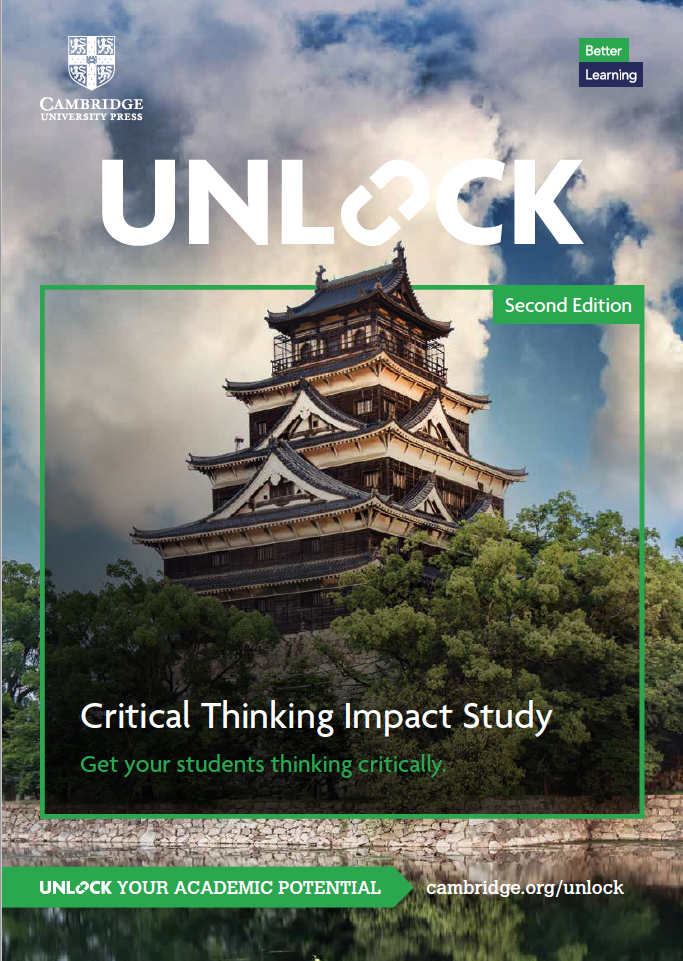
Unlock case study - Japan
Takatsuki Junior & Senior High School is a private school, with a reputation for excellence and a mission to nurture further global leaders. It has been designated as both a Super Global High School (SGH) and Super Science High School (SSH) by the Ministry of Education, Culture, Sports, Science and Technology, and is a part of the Osaka Medical and Pharmaceutical University. The school was also the first Japanese junior and senior high school to be certified as a Better Learning partner.

The challenge
Principal Tsuyoshi Kudo wanted to support his students to improve their communicative abilities in English. To achieve this, he identified a need to introduce new teaching materials along with a teacher development programme to introduce and embed new methodologies.
The solution
Cambridge worked with Takatsuki school to create a Cambridge proposition which included learning, assessment and professional development solutions to raise the standards of English language teaching and ultimately learning.
A rolling three‐year teacher development programme (recently extended to four years) was implemented to embed the communicative approach in the school, one year group at a time. The project began with a needs analysis to inform the programme design.
The solution included the introduction of Cambridge coursebook, Uncover level 1, for Junior High School 1 (JHS1) classes. This was supported with a year‐long teacher development programme for their teachers involving online training, regular tutorials and workshops, and lesson observation and feedback.
In years two and three the programme was extended using Uncover level 2 in JHS2, followed by Uncover level 3 and also Unlock level 3 when they reach JHS3. This was supported with continued teacher development activities
The school also entered their students for Cambridge English Qualifications. The Cambridge A2 Flyer exam was taken by students in year 2, with plans to take B1 Preliminary in High school. One of the teachers also took the CELTA (Certificate in Teaching English to Speakers of Other Languages) qualification which helped him become a “really confident teacher because now I know a lot of skills and techniques”.
Watch the video to find out how Cambridge has helped Takatsuki school.
The results
The JSH1 teachers have learned and implemented new communicative teaching techniques in their classrooms.
In lesson observations, teachers demonstrated increased confidence in using communicative tasks and activities.
Teachers have increased the amount time they spend speaking English in their lessons and are providing their students with more opportunities for speaking and developing their communicative skills.
Teacher focus
Interview with Maria Lupas, teaching with Unlock 2nd Edition
Maria is a Full-time Lecturer at Sophia University Junior College Division in Japan using Unlock Listening, Speaking, and Critical Thinking level 3 with her second-year English language majors.

Why did Sophia University Junior College start using Unlock – what was it that attracted you to the course?
Actually, Sophia University Junior College Division gives instructors the autonomy to choose their textbooks. I chose Unlock because it covered issues in our curriculum such as poverty, the environment, animal rights, and because I liked the clear grammatical explanations, the choice of vocabulary, and the critical thinking skills taught.
How do you use Unlock at your university?
Our class meets 2 times a week for 100 minutes each class. I assign 45 minutes of outside class preparation for each class session, and I usually assign the pre-listening vocabulary for homework. In class, I spend about 2 or 3 sessions per unit.
What do your students like about Unlock?
I think students are motivated by the interesting stories. There are many models for the speeches the students are asked to make in each unit, so the students can look back and find the expressions they need.
I really like the scaffolded note-taking for the listening passages because the book shows many note-taking styles. I also liked the stories which cover major challenges in our world such as the food insecurity, and also stories about solutions people are finding.
How have the critical thinking sections in Unlock 2nd edition helped your students?
Critical thinking is important for becoming citizens who are responsible for what happens to our world. In the information age, it is especially important to have critical thinking skills when making decisions. I think the Unlock stories present a number of points of view on the issues covered, so I find the students end up taking more varied stances on the issues than with other textbooks I used.
In Speaking, Listening, CT level 3, there is an activity about using imperatives to make an advertisement. It helps students be critical about how advertisements try to manipulate them to do things.
What do you think about the focus on Critical Thinking ‘Developing critical thinking skills in your students’, which includes teacher development objectives, in-practice activities and opportunities for review and self-evaluation?
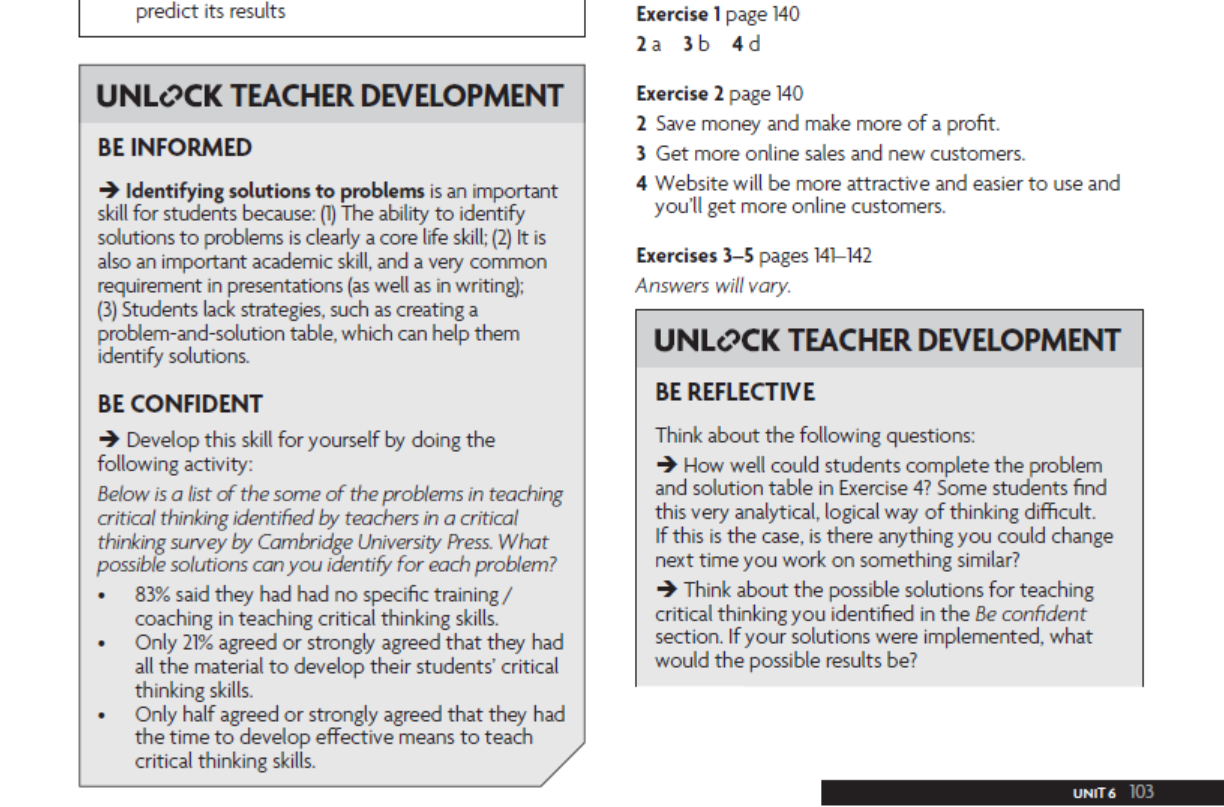
One teacher development hint was to allow students to choose what question they wanted to answer in an exercise. This meant that the student had to evaluate which answer they felt sure about. It was a small change that made our classroom atmosphere better because it showed that teachers and students have a shared responsibility in learning.
What do you get out of teaching? What keeps you going?
Every class is different, so teaching is always new. I enjoy trying to meet the challenge of each new class. Also, I feel I can always grow as a teacher and improve how I teach. I get satisfaction out of this freedom to grow. My colleagues are also great role models and I love hearing about how they work through issues in their classrooms.
Do you have any tips to motivate your students if their energy wanes?
My ‘old faithful’ activity is a deserted island speaking activity. Students have to pick 4 items that they need to survive. They are put in a small group and need to come up with their group choice of only 4 items by talking with each other and giving their individual reasons for each choice.





